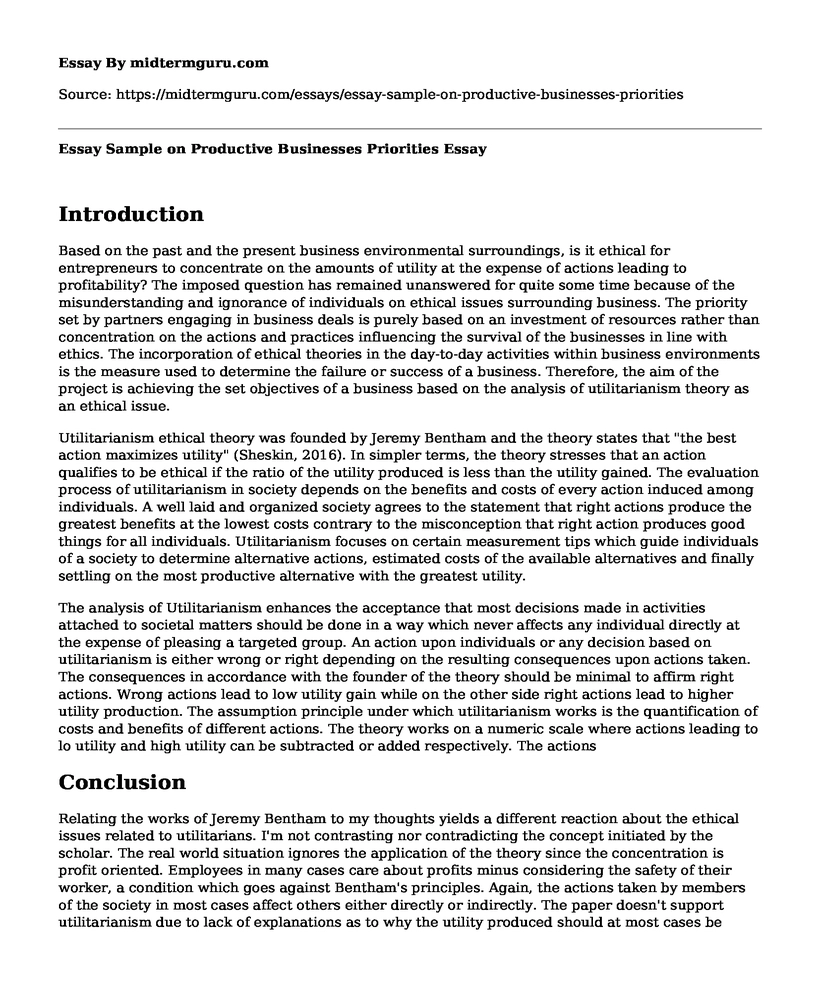Introduction
Based on the past and the present business environmental surroundings, is it ethical for entrepreneurs to concentrate on the amounts of utility at the expense of actions leading to profitability? The imposed question has remained unanswered for quite some time because of the misunderstanding and ignorance of individuals on ethical issues surrounding business. The priority set by partners engaging in business deals is purely based on an investment of resources rather than concentration on the actions and practices influencing the survival of the businesses in line with ethics. The incorporation of ethical theories in the day-to-day activities within business environments is the measure used to determine the failure or success of a business. Therefore, the aim of the project is achieving the set objectives of a business based on the analysis of utilitarianism theory as an ethical issue.
Utilitarianism ethical theory was founded by Jeremy Bentham and the theory states that "the best action maximizes utility" (Sheskin, 2016). In simpler terms, the theory stresses that an action qualifies to be ethical if the ratio of the utility produced is less than the utility gained. The evaluation process of utilitarianism in society depends on the benefits and costs of every action induced among individuals. A well laid and organized society agrees to the statement that right actions produce the greatest benefits at the lowest costs contrary to the misconception that right action produces good things for all individuals. Utilitarianism focuses on certain measurement tips which guide individuals of a society to determine alternative actions, estimated costs of the available alternatives and finally settling on the most productive alternative with the greatest utility.
The analysis of Utilitarianism enhances the acceptance that most decisions made in activities attached to societal matters should be done in a way which never affects any individual directly at the expense of pleasing a targeted group. An action upon individuals or any decision based on utilitarianism is either wrong or right depending on the resulting consequences upon actions taken. The consequences in accordance with the founder of the theory should be minimal to affirm right actions. Wrong actions lead to low utility gain while on the other side right actions lead to higher utility production. The assumption principle under which utilitarianism works is the quantification of costs and benefits of different actions. The theory works on a numeric scale where actions leading to lo utility and high utility can be subtracted or added respectively. The actions
Conclusion
Relating the works of Jeremy Bentham to my thoughts yields a different reaction about the ethical issues related to utilitarians. I'm not contrasting nor contradicting the concept initiated by the scholar. The real world situation ignores the application of the theory since the concentration is profit oriented. Employees in many cases care about profits minus considering the safety of their worker, a condition which goes against Bentham's principles. Again, the actions taken by members of the society in most cases affect others either directly or indirectly. The paper doesn't support utilitarianism due to lack of explanations as to why the utility produced should at most cases be higher than the utility gained from actions taken by individuals. It is not ethically right for an individual to invest much and gain less after investment. It is ethically right to prioritize the actions resulting in profitability with less or no interferences of individual rights within any given environment.
Work Cited
Sheskin, Mark, and Nicolas Baumard. "Switching away from utilitarianism: The limited role of utility calculations in moral judgment." PloS one 11.8 (2016): https://journals.plos.org/plosone/article?id=10.1371/journal.pone.0160084
Cite this page
Essay Sample on Productive Businesses Priorities. (2022, Sep 19). Retrieved from https://midtermguru.com/essays/essay-sample-on-productive-businesses-priorities
If you are the original author of this essay and no longer wish to have it published on the midtermguru.com website, please click below to request its removal:
- The Workflow in Service Delivery on the Example of Guestroom Cleaning
- Paper Example on Kellogg's Breakfast Cereal Division
- Case Study Analysis: Chipotle Mexican Grill
- Paper Example on Triumph Motorcycle Ltd International Expansion Plan After Brexit
- Plan for Hiring - Essay Sample
- Merger Challenges: Engaging Employees & Co-Working Post Change - Essay Sample
- Leadership Qualities: The Key to Success in Any Organization - Essay Sample







